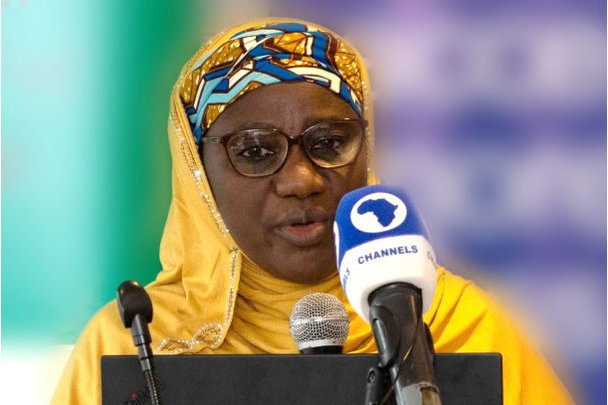Commitment of the CBN to Sustainability

Summary
The CBN welcomes the development of tools such as the SSCI as an enabler for financial institutions to meet global sustainability challenges and enhance the credible transition to a sustainable, inclusive, and resilient economy.
This address was delivered by Dr. Aisha Mahmood, Special Adviser to the Governor on Sustainable Banking, Central Bank of Nigeria, at the Joint Session of the CBN and European Organisation for Sustainable Development (EOSD) on Sustainability, for CEOs and other senior executives of commercial banks, on 31 August 2022. The event was sponsored by Access Bank PLC, and organised by Financial Nigeria International, Nigeria Country Representative to the EOSD.
I would like to thank the European Organization for Sustainable Development (EOSD) for inviting me to this joint session on Sustainability to share insights on the Central Bank of Nigeria (CBN) sustainability agenda.
I am aware that during this workshop, the EOSD will unveil its cutting-edge Sustainability Standards & Certification Initiative (SSCI) Version 2.0, which is a holistic and robust locally-sensitive set of standards aimed at enhancing the resilience, performance, and profitability of financial institutions.
Ladies and Gentlemen, you will agree with me that the SSCI will provide opportunities for mobilization of the much-needed private finance for the transition to a low-carbon economy and align the financial institutions to the achievement of global sustainability imperatives, such as the Paris Climate Agreement, the Sustainable Development Goals, the net zero carbon emission as well as national development priorities.
Sustainability standards are globally recognised tools for managing sustainability issues, and certification and accreditation are integral to the successful implementation of sustainability standards. Certification is not only a market tool and an instrument that promotes credibility and assurance, it is also a governance instrument.
Three Nigerian financial institutions, namely Access Bank PLC, Development Bank of Nigeria (DBN), and Bank of Industry (BOI) are at varying stages of implementing the SSCI. Access Bank was the first African commercial bank to be sustainability certified by the EOSD, in 2020 while DBN became the first Nigerian Development Finance Institution (DFI), and the second in Africa, to be sustainability certified.
The Bank of Industry Nigeria has been formally admitted to the Sustainability Standards and Certification Initiative and now well on its way to become a pioneer institution in this space.
I am positive that this workshop will motivate other financial institutions to adopt the initiative to build resilient economies that work for the environment, businesses and societies.
Since the adoption of the Nigerian Sustainable Banking Principles (NSBP) in 2012, the Nigerian FIs have been integrating E&S framework to manage risks and opportunities in their lending and investment decisions to ensure a smooth transition to a low-carbon economy and foster social responsibility.
But with climate change becoming an existential threat to humanity with repercussions for financial stability, the Central Bank of Nigeria has commenced the review of the NSBPs to incorporate climate-related risks and align with global and national sustainability commitments.
It is pertinent to note that climate change is a global issue and thus policies aimed at addressing its consequences should also be global and coordinated. The Central Bank of Nigeria therefore, in recognition of the profound effect of climate change on the global economy and the need for international cooperation to tackle the climate crisis, has joined the Network of Central Banks and Supervisors for Greening the Financial System (NGFS) to reaffirm its commitment to addressing climate-related and environmental risks in order to build resilience of the financial system and support the mobilization of financial flows needed to support the transition towards a sustainable economy.
The NGFS is a voluntary group of central banks and supervisors willing to share best practices and contribute to the development of environment and climate risk management in the financial sector and to mobilise mainstream finance for the transition towards a low-carbon economy. The NGFS currently consists of 116 members and 19 observers.
The Central Bank of Nigeria has also joined the Taskforce on Nature-related Financial Disclosure (TNFD), to complement the efforts and work being done on climate-related risks within the Financial Sector.
The TNFD is a new global initiative with over 400 members which aims to provide financial institutions and corporates with a complete picture of their environmental risks and opportunities. This market-led and UN-supported initiative was launched in 2021 to support a shift in global financial flows away from nature-negative toward nature-positive outcomes by providing a practical reporting framework for companies.
This is a clear demonstration of CBN’s commitment to strengthen the management of climate and environmental risks, mobilizing capital for green and low-carbon investments and improving ESG disclosure.
Ladies and gentlemen, in conclusion, the CBN welcomes the development of tools such as the SSCI as an enabler for financial institutions to meet global sustainability challenges and enhance the credible transition to a sustainable, inclusive and resilient economy.
I wish you a fruitful deliberation.
Recent Interviews
Latest Blogs
- Putting food at the centre of Nigeria’s health reform
- What is most important for Nigeria in 2026
- Restoring asset declaration as a tool of public accountability
- Tackling antibiotic resistance through safer food systems
- Big government, little governance













